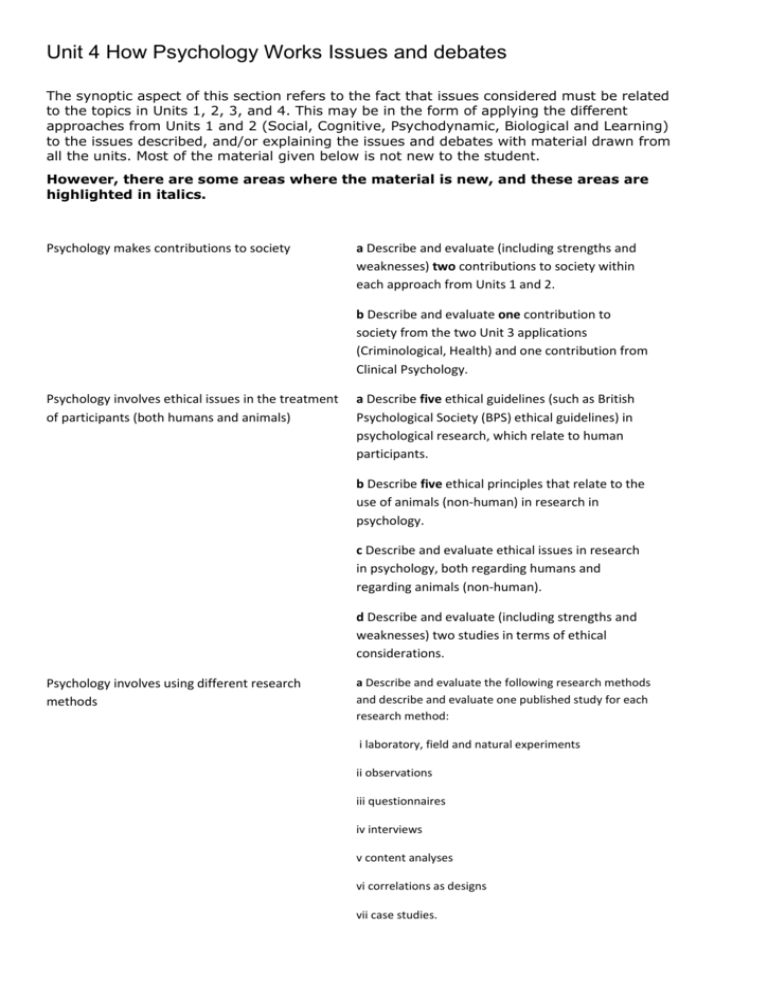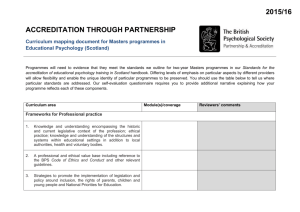Unit 4 How Psychology Works Issues and debates
advertisement

Unit 4 How Psychology Works Issues and debates The synoptic aspect of this section refers to the fact that issues considered must be related to the topics in Units 1, 2, 3, and 4. This may be in the form of applying the different approaches from Units 1 and 2 (Social, Cognitive, Psychodynamic, Biological and Learning) to the issues described, and/or explaining the issues and debates with material drawn from all the units. Most of the material given below is not new to the student. However, there are some areas where the material is new, and these areas are highlighted in italics. Psychology makes contributions to society a Describe and evaluate (including strengths and weaknesses) two contributions to society within each approach from Units 1 and 2. b Describe and evaluate one contribution to society from the two Unit 3 applications (Criminological, Health) and one contribution from Clinical Psychology. Psychology involves ethical issues in the treatment of participants (both humans and animals) a Describe five ethical guidelines (such as British Psychological Society (BPS) ethical guidelines) in psychological research, which relate to human participants. b Describe five ethical principles that relate to the use of animals (non-human) in research in psychology. c Describe and evaluate ethical issues in research in psychology, both regarding humans and regarding animals (non-human). d Describe and evaluate (including strengths and weaknesses) two studies in terms of ethical considerations. Psychology involves using different research methods a Describe and evaluate the following research methods and describe and evaluate one published study for each research method: i laboratory, field and natural experiments ii observations iii questionnaires iv interviews v content analyses vi correlations as designs vii case studies. b Plan a study of their own when given a context, giving aim, hypotheses, design, procedure, ethical considerations, and how results would be analysed (including choice of statistical test as appropriate), and be able to evaluate the study. c Evaluate psychological studies with reference to the research methods used, including making suggestions for improvements (eg improving controls, changing the chosen method, improving reliability or validity). Note: a study may be given as stimulus material for evaluation. Psychology involves issues of relevance to today’s society (key issues) Describe and explain using concepts, theories and research (as appropriate) the key issues studied for each of the approaches in Units 1 and 2, for their two chosen applications in Unit 3, and for clinical psychology in Unit 4. Note: students should use their knowledge of the approaches, applications, research method issues, and ethical issues when commenting on these key issues as appropriate. 5 Psychology involves different debates Cultural differences a Describe and evaluate issues of ethnocentrism in psychological research, including the potential effect of cultural bias in the interpretation and application of cross-cultural studies. How far psychology is a science b Describe the debate over what science is and how far psychology fits the definition. Evaluate whether psychology should be called a ‘science’. c Compare the five approaches from Units 1 and 2 according to how scientific their content and methods are. How psychological knowledge is used in issues of social control d Describe issues related to the use of psychological knowledge as a means of social control and assess ethical and practical implications of such control. Issues should include: i u use of drug therapy I token economy iii classical conditioning iv influence of the practitioner in treatment/therapy. The issue of nature and nurture e Describe and evaluate the role of both nature and nurture in explaining human behaviour, drawing on material (including content and methods) studied in psychology. f Psychology involves being able to applya knowledge to new or previously not considered situations Explain the differing emphases placed on both nature and nurture by the various approaches and/or applications studied. Evaluate previously unseen stimulus material concerning an issue using psychological concepts, theories and/or research (as appropriate) from the different approaches and/or applications (as appropriate).




